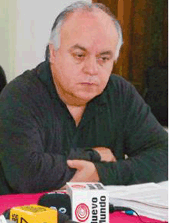Guatemala: Civil society warns about lack of public health funds
Published on Sun, 2011-06-19 23:02
Source The Ministry of Public Health and Social Welfare of Guatemala is undergoing a crisis and needs additional funds to fulfil its caregiving functions, warned Alejandro Aguirre, coordinator of the Citizen Participation programme of the NGOs and Cooperatives Coordination (Congcoop, national focal point of Social Watch). According to a study carried out by Congcoop, hospitals had a 1.6 billion quetzal budget (approximately 200 million dollars) last year, amount that was reduced this year to 1.5 billion quetzal (some 188 million dollars). About 300 million additional quetzal (37 million dollars) would be needed to prevent a public health system crisis. The hospital network will continue to undergo a permanent crisis due its deteriorated infrastructure and the lack of equipment to provide outpatient care, stated researcher Arlyn Jiménez, also of the Citizen Participation Programme of Congcoop. Both experts participated, together with officers and representatives of other countries, in activities to encourage people to pay taxes. According to the organization, the total budget of the Ministry of Public Health and Social Welfare, which amounts this year to 4.12 billion quetzals (516 million dollars), together with the health care model, prevent the fulfilment of people’s needs as well as the enforcement of this basic right. To cover healthcare, education and security demands, among other areas, it is essential that all Guatemaltecans pay their taxes, said Villeda. Finance Minister Alfredo Rolando del Cid Pinillos agreed with the expert and highlighted the need to create and promote a tax culture within the Guatemaltecan society, which has growing demands and therefore needs more resources. “If we want a different Guatemala, we have to be good and responsible citizens in the fulfilment of our duties”, added the Superintendent of Tax Administration, Rudy Villeda. These concerns were expressed during the Citizen Culture activities “Juntos Podemos Más” [Together We Can Do More] that took place in the capital city, Quetzaltenango and Cobán. |





